- Trump considering military options on Greenland; Europe rejects |
- Fertiliser crunch threatens Kushtia’s onion boom despite high prices |
- Security Council Divided on United States' Venezuela Action |
- Over 1.53m voters register for postal balloting: Shafiqul Alam |
Turmeric: A Closer Look at Its Proven Health Benefits

Turmeric, the bright yellow spice extracted from the rhizomes of the Curcuma longa plant, has captured global attention for its diverse culinary and medicinal properties.
A member of the ginger family, turmeric thrives in warm climates and has been a cornerstone of traditional medicine and cooking for centuries, according to Harvard Health.
At the heart of turmeric’s potential health benefits is curcumin, its active compound. Research has highlighted curcumin’s broad therapeutic potential, linking it to anti-inflammatory, antioxidant, anticancer, antidiabetic, and antimicrobial effects. A 2020 study even revealed its antiviral and antidiarrheal properties, further amplifying interest in its health-promoting abilities.
Historically, turmeric has been a staple in Ayurvedic and Traditional Chinese Medicine, where it has been used to treat a variety of ailments, from skin conditions and respiratory issues to joint pain and digestive disorders. Today, it is widely marketed as a dietary supplement, commonly recommended for conditions like arthritis, allergies, and even mood disorders like depression.
Emerging human studies suggest that curcumin may be effective in alleviating osteoarthritis pain, offering a natural alternative to conventional painkillers. However, experts caution that further research is necessary to fully understand its broader health benefits and determine optimal dosages for various conditions.
Beyond its medicinal uses, turmeric is an essential ingredient in many cuisines, particularly in South Asian cooking. Its earthy flavor and vibrant color make it a versatile addition to curries, rice dishes, smoothies, and even beverages.
To enhance the absorption of curcumin in the body, experts recommend consuming turmeric with healthy fats, such as those found in oils or coconut milk, which help boost its bioavailability in the gastrointestinal tract.
With its combination of culinary versatility and compelling health benefits, turmeric remains a cherished spice in kitchens and medicine cabinets around the world. As research continues, its full potential may become even more apparent, solidifying its place as both a flavorful addition to meals and a valuable component of holistic health practices.

